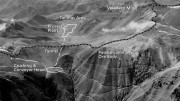Businessman and Bay Street veteran Peter Crossgrove, the one-time Placer Dome CEO and long-time Barrick Gold director, published his memoirs last year, and it makes for some lively and insightful reading, especially in light of Barrick’s newly revamped executive compensation program.
In his book titled “Boardroom games: You’re fired! When core values, respect and meaningful business practices are compromised for money and prestige,” Crossgrove is blunt in his criticism of the Barrick board, from which he was booted a couple of years ago to make way for Goldman Sachs’ John Thornton, who will become full Barrick chairman at the April 30 annual meeting, as founder Peter Munk retires.
“What do I think Barrick has to do to recover?” writes Crossgrove in 2013. “First of all, I would say they should find at least three directors who know the operating side of the business and form a technical committee . . . I suggest the chair, vice-chair and board members’ salaries be cut by 70%. They should only allow the chief operating officer the use of the corporate jet and get rid of the advisory board, which is a large expense and should be deleted . . . in 22 years I can only recall one meeting with the advisory board, whom I believe meet one day a year and are paid $100,000 per year.”
He noted that while Barrick’s stock had lost more than half its value in the prior year, “the directors have increased their pay from approximately $120,000 per year to over $220,000 annually. I have made this statement repeatedly because none have any mining or geological experience.” (Of course, long-time director Brett Harvey is a mining engineer, but Crossgrove notes he’s busy running Pittsburgh-based major CONSOL Energy.)
Crossgrove adds that “Peter Munk goes to Switzerland in the winter and likes to go to Montenegro in the summer. Even though he’s on the phone every day, there’s no doubt about it — it’s just not the same as being present. Peter doesn’t visit the mines . . . nobody else really visits the mines . . . they don’t even show up for openings.
“Most of the directors of Barrick have never been to a mine, and if they did, they wouldn’t know what the hell they were looking at.”
Fast-forward to March 31, and Barrick has introduced its new executive compensation program, prompted by the shareholder revolt last year over the increasingly rich and growing pay packages for Barrick execs, even as the company’s share price nosedived.
Shareholder anger crystallized around a US$17-million pay package in 2012 for incoming vice-chairman Thornton, which included a US$11.9-million signing bonus that instantly made him one of Canada’s highest paid executives.
For 2013, Thornton’s pay was reduced to US$9.5 million. As a non-mining person who was touted for his Chinese financial connections (e.g., China Unicom, HSBC and Ford Motor) when he was first hired by Barrick, it’s still not clear why he is receiving such a large salary. There haven’t been developments at Barrick over the last two years that seem to relate to his skills and experience, or primary residence in Palm Beach, Florida.
Meanwhile, fans of former Prime Minister Brian Mulroney will be pleased to know last year he pulled in C$1 million in annual salary, plus a C$250,000 bonus as a Barrick director and senior advisor for global affairs. (There’s no indication in Barrick’s Annual Information Form whether he was paid in cash stuffed in envelopes at meetings held in hotel rooms, for old times’ sake.)
The biggest change to Barrick’s executive pay is that more of it will be doled out in the form of Barrick shares that will be bought in the open market, and these shares can only be sold upon leaving the company. It’s an odd restriction, in that it will entice top management to leave if and when the company once again becomes a strong performer and the share price really takes off. It would also incentivize poorly performing directors to stick around longer than they probably should if the stock tanks.
There are also new minimum share ownership requirements for top execs, with a grace period to reach required levels. Another new approach is to tie bonuses to a transparent scorecard of basic metrics, such as return on invested capital, dividends paid, capital-project performance and free cash flow.
Crossgrove’s criticism of the Barrick board’s lack of mining experience is finally being rectified, to some extent: financier and mining legend Ned Goodman and Appalachian met-coal miner Xcoal Energy and Resources’ CEO Ernie Thrasher are becoming Barrick directors — two of four new independent directors coming on-board to replace the departing or departed Munk, Mulroney, Howard Beck, Donald Carty and Robert Franklin.



Be the first to comment on "Editorial: Barrick rejigs exec pay"